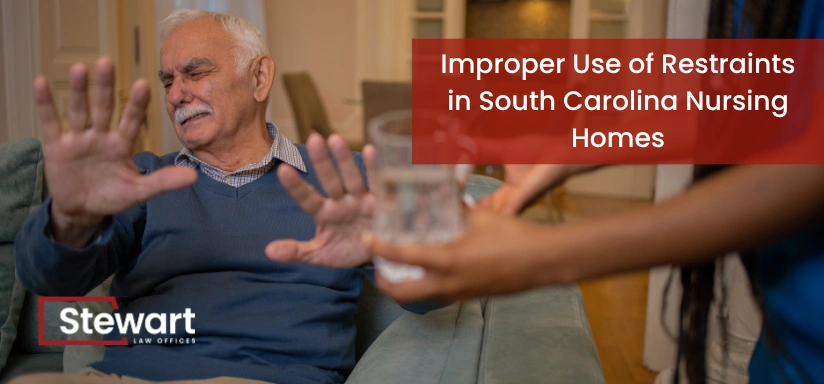Families trust nursing homes to care for their loved ones with dignity and compassion. Unfortunately, some facilities misuse restraints, leading to serious physical and emotional harm. South Carolina law and federal regulations limit when and how restraints may be used, yet violations still occur.
Suppose you suspect your family member is being restrained improperly. In that case, it’s critical to understand the warning signs, the rules facilities must follow, and the legal options available to protect your loved one.
What Are Restraints in Nursing Homes?
Restraints are tools or methods used to limit a resident’s movement or behavior. They fall into two main categories:
- Physical restraints: Items such as belts, straps, bed rails, or chairs that prevent a resident from moving freely.
- Chemical restraints: Medications, often sedatives or antipsychotics, are administered to control behavior rather than treat a medical condition.
While restraints may sometimes be necessary to protect a resident from immediate harm, they are strictly regulated. Under the Nursing Home Reform Act of 1987, restraints must only be used when medically necessary and never for discipline or staff convenience.
Types of Abuse Linked to Improper Use of Restraints
When nursing homes misuse restraints, the harm often goes far beyond temporary discomfort. Abuse can take several forms, including:
Physical Abuse
Improper restraint use can lead to:
- Cuts, bruises, or broken bones from tight straps or falls caused by restraint devices.
- Loss of muscle strength and mobility from prolonged immobility.
- Pressure sores and infections due to being confined to a bed or chair.
Psychological and Emotional Abuse
Being tied down or sedated without medical necessity is degrading and terrifying for residents. It often causes:
- Anxiety, fear, and depression.
- Loss of dignity and independence.
- Emotional withdrawal and isolation.
Chemical Restraint Abuse
The use of powerful drugs to keep residents quiet or manageable is one of the most dangerous forms of abuse. Chemical abuse occurs when medication is used to control behavior for staff convenience, not medical treatment. This can lead to over-sedation, health complications like respiratory issues and cognitive decline, and loss of independence, ultimately diminishing a resident’s quality of life and autonomy.
Legal Standards for Restraint Use in South Carolina
Restraints in nursing homes are tightly regulated under federal and South Carolina rules. A physician must order any restraint in writing (within 24 hours if it’s an emergency). Staff must write down the reason, check the resident every 15 minutes at first, and let them move every 30 minutes. Long-term use needs regular doctor review.
Residents have the right to be free from restraints used just for staff convenience or discipline. Restraints are only allowed to treat medical symptoms. If a facility breaks these rules, it can be strong evidence of neglect in a lawsuit.
An experienced nursing home abuse lawyer can help families hold the facility accountable and protect their loved one.
Why Nursing Homes Improperly Use Restraints
Restraints should always be a last resort, but some facilities misuse them for reasons unrelated to patient care:
- Understaffing: With too few employees, facilities may restrain residents to make supervision easier.
- Lack of training: Staff may not know alternative de-escalation techniques.
- Convenience or discipline: Some facilities use restraints to control behavior or punish residents.
- Cost-cutting: Restraints can substitute for individualized care, saving time and money but putting residents at risk.
These practices violate federal law and South Carolina’s Residents’ Bill of Rights § 44-81-40(G), which guarantees freedom from unnecessary physical or chemical restraints.
How to Report Nursing Home Restraint Abuse in South Carolina
If you suspect your loved one is being abused through improper restraints, it’s important to act quickly. Why? Because every day of delay could put them at risk of further harm.
You have several options. For example, you can file a complaint with the South Carolina Department of Health and Environmental Control (DHEC), the agency responsible for regulating nursing homes. You can also reach out to the South Carolina Long-Term Care Ombudsman Program, which investigates reports of mistreatment. If the resident is in immediate danger, Adult Protective Services should be contacted without hesitation.
It’s also wise to document everything, photos of injuries, medical records, and notes about conversations with staff. These details can provide critical evidence if legal action becomes necessary.
Taking these steps does more than protect your family member. It also helps hold negligent facilities accountable and prevents other residents from suffering the same kind of abuse.
How a Nursing Home Abuse Lawyer Can Help Victims
Families often feel overwhelmed when confronting large nursing home corporations, but a skilled South Carolina nursing home abuse lawyer can be a powerful ally. They can investigate facility practices, gather medical evidence and expert testimony, and file claims for compensation covering medical bills, pain and suffering, and other damages.
Legal action not only may help your family seek justice under South Carolina law but also pressure negligent facilities to improve conditions and prevent future harm.
